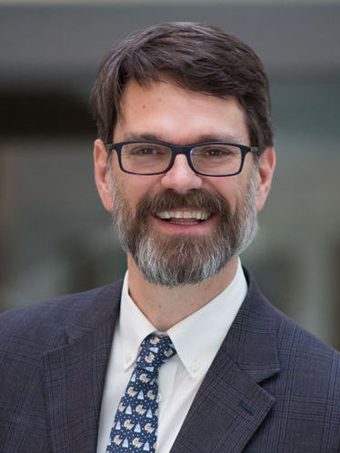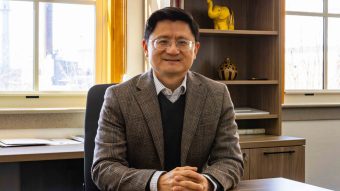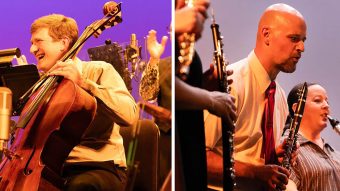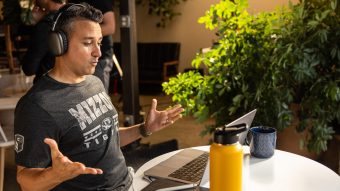
Dec. 5, 2024
Contact: Sara Diedrich, diedrichs@missouri.edu
There is no question that students graduating from college today will enter a workplace on the brink of a technological revolution. The swift progress of artificial intelligence (AI) has captivated the world and raised questions about its impact on jobs and the future of work.

Students at the University of Missouri’s Robert J. Trulaske, Sr. College of Business are learning to embrace generative AI and other emerging technologies while also honing essential workforce skills, such as critical thinking, analytical thinking, resilience, flexibility and lifelong learning.
The goal? To prepare technologically proficient students who can confidently navigate the evolving workplace while understanding the importance of human connections.
In J. Scott Christianson’s Management 4710 class, students are learning to “think like scientists” when using AI in the classroom.
“We are experimenting with using AI, seeing where it performs well, where it performs poorly and what we can replicate,” said Christianson, associate teaching professor and director of the college’s Center for Entrepreneurship and Innovation. “Just like scientists who replicate their results, businesspeople and entrepreneurs want to have something that can be reliably replicated.”
Empowering students with AI
In class, Christianson’s students spend several weeks trying out various generative AI tools, such as ChatGPT, a virtual assistant trained to follow an instruction in a prompt and provide a detailed written response.
“The caveat was the students had to write a reflection on their use of ChatGPT,” he said. “I wanted them to think about how they used it and how it responded.”
After learning more about the technology, students wrote an AI use policy for the class. They also learned how to develop a machine learning algorithm to classify different objects or images. Additionally, they used AI to assist with writing a computer code in class and explored AI’s integration into websites using WordPress, a web content management system that can be used to support publishing websites and online stores.
“For entrepreneurs, e-commerce is often an important part of their business,” Christianson said. “So, the students have looked at how to use AI to help build out websites.”
Student offers AI-driven solution at internship
Like most of his peers, Seth Adams was already experimenting with generative artificial intelligence by the time he landed in Christianson’s class last spring.
But the opportunity to learn more about AI gave Adams, a senior with an emphasis in management, the confidence to use the technology at his internship, where he sends multiple emails to contact potential customers.
“So, I started playing around with it,” he said. “Most of my friends are already using AI to help them with various tasks. This seemed like the perfect opportunity to try it out.”
First, Adams used ChatGPT to help him craft the text of his email. Then, with the help of his roommate, a computer science major, he created a marketing strategy powered by generative AI that would automatically send his email to multiple potential customers.
Adams was encouraged that his idea aligned with his company’s philosophy for using generative AI in the workplace. He’s also grateful his instructors at Trulaske are giving students opportunities to think critically about emerging technologies.
“I think AI is going to help tremendously with productivity by removing redundancies and human error,” Adams said. “The way to beat the fear about AI is early exposure and understanding so we can adapt and know the risk factors to better prepare us for the workforce.”
Read more from the Robert J. Trulaske, Sr. College of Business


